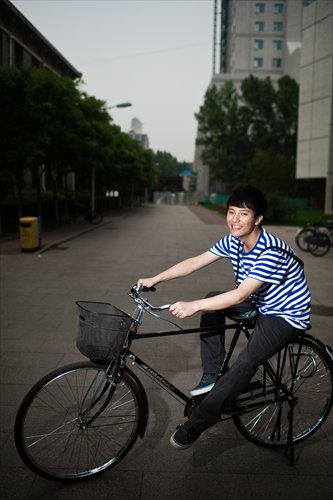
The "little fresh meat" phenomenon is being driven by middle-aged women with money. (Photos: GT/Li Hao)
Chinese women hunger for fresh-looking boys and young men
On the first day a new colleague came to work in her office, Violet Wang could barely hide her excitement. The 24-year-old office clerk said that like many women in the office, they had been expecting a new face for a long time, and they were thrilled to have a good-looking man in the workplace. "He's thin and tall, and looks good in white shirts," said Wang. "His skin is not very good, but he still looks young and innocent like a college student."
The women in the office privately referred to him as "little fresh meat," a popular meme referring to good-looking young men, usually between the age of 12 and 25. A search using China's largest search engine Baidu with the key word "little fresh meat" yields more than 11 million results, with people talking about not only the young celebrities, but also fresh-faced young men discovered by Web users, and new faces people know from their own lives.
While some enjoy themselves in the visual feast of good-looking men, some find the label offensive. Experts said the phenomenon helps people read into how Chinese women's aesthetic appreciation of men has evolved through the years, and reflects changes in China's social structure.
A spreading cultural phenomenon
Wang said she is no stranger to how Web users are crazy about the freshest batch of "little fresh meat." The popularity of the little fresh meat on the Chinese Internet usually happens fast, sometimes just overnight.
One example would be a video posted online that went wildly popular in February. The video is of a man singing in front of a camera and another good-looking young man in the background nodding and smiling along on the upper berth of a bunk bed. The latter was affectionately dubbed the "upper bunk brother" by Chinese Web users. Web users unveiled his personal information in no time, revealing that he is a student pilot named Xing Yuanbo, the Xinhua News Agency reported. Xing soon gained 670,000 followers on his Sina Weibo account. The original post has been forwarded more than 46,000 times and commented on more than 23,000 times, with many women young and old saying, "Come to my bowl, you little fresh meat! "
"To me, [the definition of] little fresh meat means being young, with bouncy and collagen-filled skin," said Stephanie Zhong, 31, a senior fashion editor for Beijing-based LifeStyle magazine. "[They] also need to show a hint of immaturity and tenderness to be called little fresh meat."
"[They don't necessarily] have to be muscular, but their face should be fresh," said Zhong, who mainly works in photography, shooting celebrities and fashion icons for the magazine. Zhong has shot several features with the theme of little fresh meat in the past year.
During her work, Zhong noticed that many pop stars and actors with a little fresh meat image will highlight this image with clothing choices, such as white shirts. "Men's fashion photography is not for men, but for women."
Having witnessed the scene of many middle-aged fans cheering and screaming for their beloved TFBoys, a teen pop band, Zhong said there's no denying that little fresh meat is hot at the moment. "I am not sure, but it seems that in my experience, women older than 40 and homosexual men are especially crazy about [little fresh meat]."
Although personally preferring men who are more sophisticated, like 55-year-old British actor Colin Firth, Zhong said the attention that little fresh meat guys receive has recently overtaken the attention given to dashu, that literally translates as "old uncles," a term referring to mature men.
"The types of men that women like go to two extremes. Some women like the rugged kind, while others like those with delicate skin who take good care of their looks, like the pop stars from Japan and South Korea," she said. "Unlike Western women, who attach much importance to a man's body shape and muscles, Chinese women tend to care more about the face."
The Daily Mail reported that global sales for men's skincare products has grown 20 percent yearly from 2008 to 2013. The Yonhap News Agency reported in March that men in South Korea each month use 13.3 make-up and skincare products including toner and facial masks, compared to 27.4 products for women.
















































